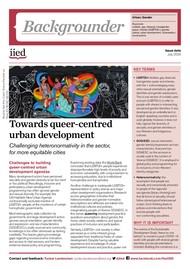Beyond inclusion: a queer response to climate justice

As climate impacts escalate and the links between climate and gender are increasingly recognised, it is timely to understand how climate change affects sexual and gender diversities and it is important to emphasise that ‘gender’ is not synonymous with women. Vulnerability to climate change is intersectional, often based on gender, race and disability, as well as sexual orientation, gender identity/expression and sex characteristics. The root causes of climate vulnerability are in who holds power and privilege and who is disadvantaged and excluded.
Globally, LGBTQI+ groups continue to be marginalised in accessing rights, resources and decision-making processes. This marginalisation is made worse because LGBTQI+ groups are invisible in discussions about climate change vulnerability and impacts. This must change to ensure climate action does not perpetuate the same injustices queer people consistently face in other realms. Climate justice involves understanding the root causes of interlinked oppressions, connecting struggles for climate justice, gender justice, racial justice, intergenerational justice, disability justice and others to colonialism, capitalism and extractivism. A climate-just future also requires queer justice.
Cite this publication
Available at https://www.iied.org/21546iied

